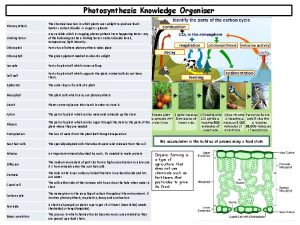Photosynthesis Knowledge Organiser Photosynthesis The chemical reaction in

- Slides: 1

Photosynthesis Knowledge Organiser Photosynthesis The chemical reaction in which plants use sunlight to produce food: Water + carbon dioxide oxygen + glucose Limiting factor Any variable which is stopping photosynthesis from happening faster. Any of the following can be a limiting factor: carbon dioxide levels, temperature, light intensity. Chloroplast Part of a cell where photosynthesis takes place Chlorophyll The green pigment needed to absorb sunlight Vacuole Part of a plant cell which stores cell sap Cell wall Part of a plant cell which supports the plant. Animal cells do not have them. Epidermis The outer layer of a cells of a plant Mesophyll The plant cells which carry out photosynthesis Starch Plants convert glucose into starch in order to store it. Xylem The part of a plant which carries water and minerals up the stem Phloem The part of a plant which carries sugar through the stem to the parts of the plant where they are needed Transpiration The loss of water from the plant leaf through evaporation Root hair cells The specially adapted cells that absorb water and minerals from the soil Nitrates An important mineral absorbed by roots. It’s needed to make protein Diffusion The random movement of particles from a high concentration to a low one. It is how minerals enter the root hair cells Stomata The hole in the lower surface of a leaf that lets in carbon dioxide and lets out water Guard cell The cells either side of the stomata which can close the hole when water is short Carbon cycle The name given to the recycling of carbon throughout the environment. It involves photosynthesis, respiration, decay and combustion Pesticide A chemical sprayed on plant crops to get rid of insect (insecticide) weeds (herbicide) or fungi (fungicide) Bioaccumulation The process in which chemical toxins become more concentrated as they are passed up a food chain. Organic farming is a type of agriculture that does not use chemicals such as fertilisers And pesticides to grow its food.

